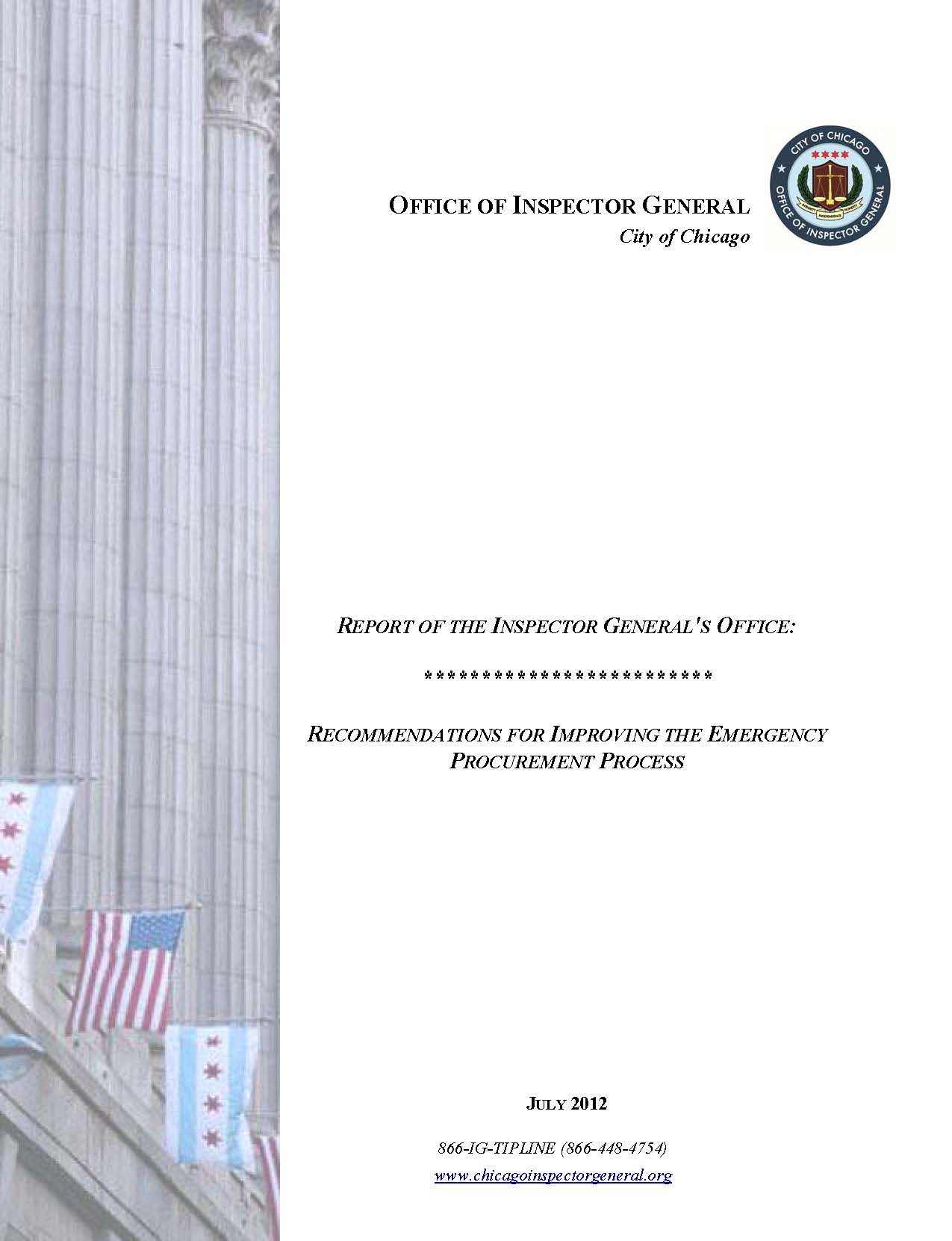Recommendations for Improving the Emergency Procurement Process
Summary
The City of Chicago Office of Inspector General (IGO) has concluded an investigation into a series of emergency contracts awarded to a single City vendor.
Executive Summary
The City of Chicago Office of Inspector General (IGO) has concluded an investigation into a series of emergency contracts awarded to a single City vendor. Under the City’s procurement policies, emergency contracts are not required to be advertised nor are they required to be awarded pursuant to an open and competitive bidding process.
The contracts identified in the IGO’s investigation—ten separate, sequential, unadvertised operating emergency contracts for concrete sewer pipes with an approximate total value of $2.4 million—were awarded by the Department of Procurement Services (DPS) between March 2010 and April 2011. DPS issued the first emergency contract after it had abruptly terminated performance on a then-existing competitively bid contract for the provision of those supplies. DPS chose to terminate the contract after initiating debarment proceedings against the supplier, Azteca Supply Co., after Azteca was indicted for MBE/WBE program fraud. DPS issued nine more emergency contracts before April 2011, when it entered into a new five-year supply contract with another vendor.
The IGO investigation established that the consequences of DPS’s decision to abruptly terminate the regularly procured contract, leading to the need for emergency contracts, were exacerbated by lax management of the process for re-letting a new supply contract. Despite the declared contract emergency, approximately a year passed before the new contract for what was a fully anticipated, ongoing supply of concrete sewer pipe was let. During that unnecessarily protracted procurement process, the City spent approximately 30% more for concrete sewer pipe under the emergency contracts than under the new, competitively bid contract and approximately 10% more than it would have under the previous contract. The parties involved in the procurement and drafting of the new contract (the user department – Department of Water Management, DPS, and Department of Law) all blamed each other for the delay. Viewed in isolation, there may be merit to some of the blame shifting, but ultimately DPS, which is vested with responsibility for managing the procurement process, bears responsibility for the delay. The investigation further established that DPS authorized the emergency contracts without adequately documented justification, contrary to DPS’s internal emergency procurement policies.
The IGO issued several recommendations to improve the emergency procurement process, including that DPS:
- develop standards for more thorough documentation of its justification for emergency contracts;
- improve its management of the emergency contracting process to avoid excessive delays that necessitate the sequential issuance of emergency contracts;
- proactively consult with departments to determine whether interim restrictions or contract termination will necessitate emergency contracts; and
- undertake a cost-benefit analysis of a proposed contract termination to assure it does not result in disproportionate cost to the taxpayer.
In her reply, DPS Chief Procurement Officer (CPO) Jamie Rhee explained that DPS’s termination of the Azteca contract was consistent with both existing law and the DPS policies at the time of Azteca’s indictment. The CPO, however, stated that DPS is always interested in better ways of approaching emergency procurement situations and welcomed the IGO’s suggestions. The department has developed a new request form to improve documentation of its justification for authorizing emergency contracts. Additionally, DPS reported that it would take measures to improve its communication with the Department of Law and City departments requesting emergency procurements to address the concerns raised by the IGO. The IGO thanks DPS and CPO Rhee for their cooperation in this matter and for their responsiveness to the IGO’s recommendations.
The IGO views DPS’s planned changes as a strong step toward improving the emergency procurement process. The IGO anticipates performing a follow-up evaluation of the design and operational effectiveness of these improvements during the fourth quarter of 2012, at which time DPS’s changes will have been in operation for a sufficient time period to permit such an evaluation. The results and the department’s response have been published on the IGO’s website.
Subscribe to the OIG Bulletin to get notified aboSut future publications.

